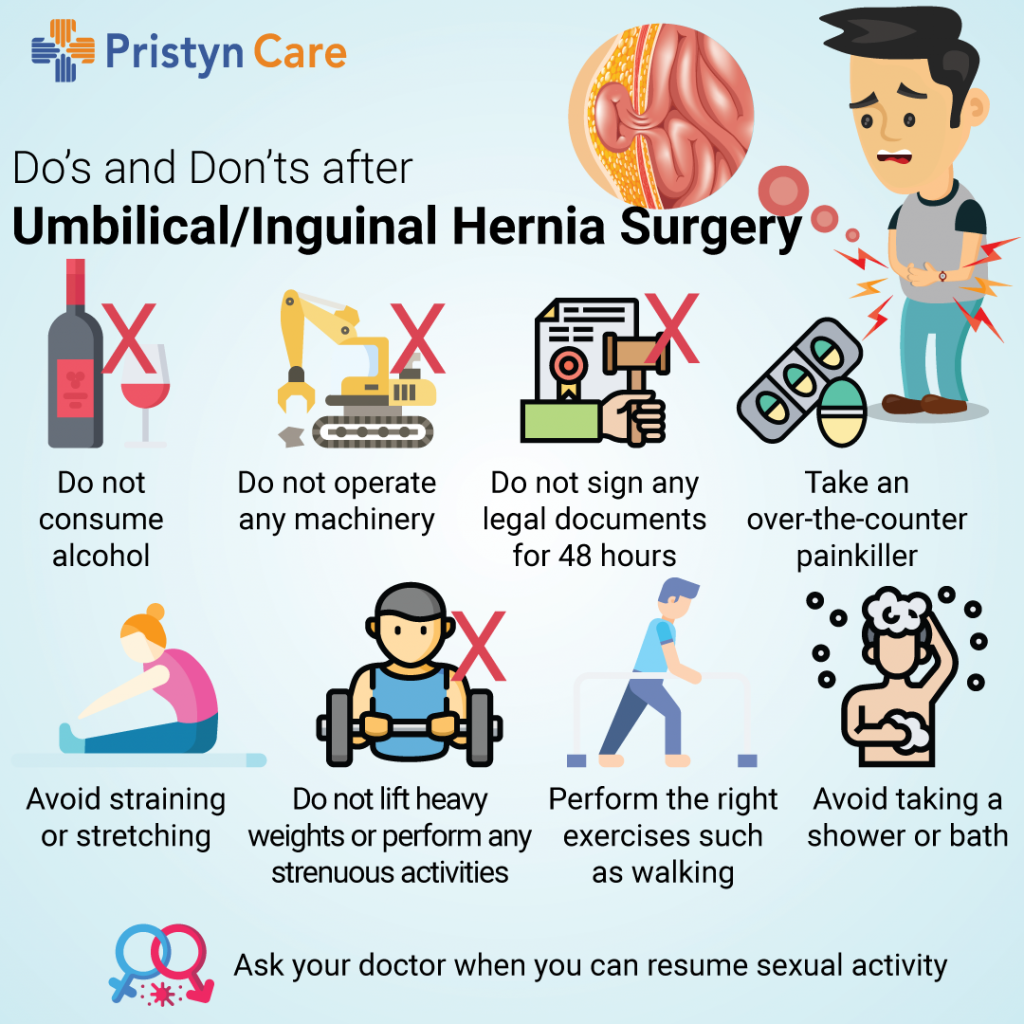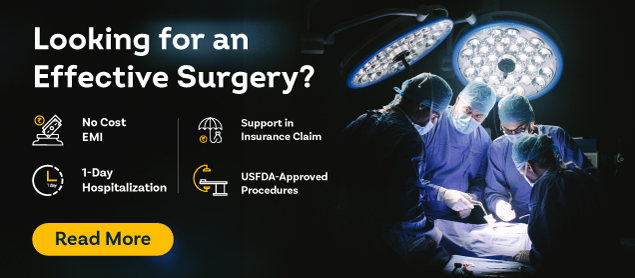
Hernia is a disease. For every disease, there are certain dos and don’ts that a patient needs to follow. A hernia occurs when tissue protrudes from its original place. An interesting fact to note here is that inguinal hernia is very common in infants and children. The most appropriate treatment to repair a hernia is laparoscopic surgery, especially in infants because of the reducing risk of wound infection.
Table of Contents
Types of hernia
A hernia is broadly categorized into two- Ventral (occurs along the vertical center of the abdominal wall) and inguinal (occurs around the groins and top of the legs). Furthermore, there are three types of ventral hernia – hiatus, umbilical and incisional.
- Hiatus hernia – Occurs near the diaphragm that separates the abdomen from the chest
- Umbilical hernia – Develop in the area of the belly button
- Incisional hernia – Occurs around the site of a previous surgery
An Inguinal hernia can be of two types –
- Unilateral – Occurs on one side of the groin
- Bilateral – Develops on both sides of the genital parts
Symptoms of Hernia
Leaving a hernia untreated for long is not wise as it gets worse and bigger with time. But you might be thinking how to know whether you have a hernia or not. If there’s a bulge on either side of the pubic bone, especially when you are standing or sitting upright then don’t turn a blind eye. This can be a hernia!
- Pain
- Burning sensation in the area
- The bulge around the area
- Nausea
- Vomiting
- A feeling of weakness
What are the risk factors of hernia?
But who all are more prone to developing a hernia? People who are-
- Smokers
- Above 60 years
- Born with weak muscles
- Suffering from chronic constipation
- Pregnancy
Do’s and Don’ts during hernia
If you are diagnosed with a hernia, it is important to follow a set of instructions so that the condition doesn’t get worse before the surgery.
| Do’s | Don’ts |
| Consume fruits and vegetables | Reduce the amount of food you consume |
| Drink at least 1.5-2 liters of water daily | Excessive straining during bowel movement |
| Increase liquid intake to prevent constipation | Smoke and drink |
| Sweat and lose excess toxins without straining | Lie down immediately after meals |
Treatment of Hernia
In the case of hernia, doctors recommend surgery. There are two ways to treat hernia – “open” surgery and laparoscopic treatment.
In open hernia repair surgery, a single long incision is made in the protruding area. The hernia sac is pushed back or tied off for removal. The risk of recurrence is reduced by sewing the patches of mesh over the weak muscles.
Studies show that laparoscopic procedures, which are also known as minimally-invasive surgery, are more successful in providing relief from hernias than other traditional “open” surgery. Many patients ask their doctor about the laparoscopic procedure.
Also Read: Why To Choose Laparoscopic Hernia Treatment
Do’s and Don’ts after Umbilical/Inguinal Hernia Surgery

Here is a list of instructions that can help recover fast and without any complications after an umbilical hernia repair.
- Do not consume alcohol, operate any machinery or sign any legal documents for 48 hours until the effects of general anesthesia wear off.
- To get relief from the pain, take over-the-counter painkillers prescribed by the doctor.
- Avoid straining or stretching as this can put pressure on the wound.
- Do not lift heavy weights or perform any strenuous activities for the initial days of recovery. But as you start lifting heavy objects, use your knees and back and not the abdominal muscles.
- Perform the right exercises such as walking that helps to speed up the recovery.
- Avoid taking a shower or bath for at least two days.
- According to your physical comfort, you can ask your doctor when you can resume sexual activity.
Let pain be your guide. This means that if you feel pain or discomfort after performing any such activity, simply stop doing it.
Diet after Hernia surgery
It is normal to lose appetite after the surgery. This could be due to the stress of surgery. Some foods that can speed up the healing process after hernia surgery-
- Increase your protein intake by consuming – Eggs, cottage cheese, soy, fish, meat, dairy, nuts
- Improve vitamin C intake by consuming – Potatoes, citrus fruits such as oranges, lemons, etc. , cauliflowers, spinach, tomatoes
- Increase your vitamin D intake by consuming – Orange juice, Cereals, Almond milk
- Increase your calcium intake by consuming – Dairy like cheese, milk, and yogurt. Seeds such as poppy, sesame, chia seeds, and almonds are good for you
Conclusion
The main causes for a hernia include chronic constipation, prolonged cough, lifting heavy weights or poor nutrition. Another important factor that aggravates the chances of a person to develop hernia is obesity. Recent studies suggest that laparoscopic treatment has a higher success rate in curing hernia than open surgical methods. Our doctors at Pristyn Care are specially trained in laparoscopic surgeries for curing hernia. Get it done now!
*Disclaimer: The content is written and reviewed as per the expertise and knowledge of the author and reviewer. For a final call related to ailment, we highly recommend people to Consult with a Specialized Doctor and take necessary decisions as per the Doctor’s suggestions.









I am suffering from a hernia in the groins. This blog helped me a lot to understand what should I do as well as avoid to get relief from a hernia. After reading, I think I’ll be able to get some relief from the discomfort. Thanks for sharing! Is the laparoscopic surgery mentioned here a permanent solution?
yes